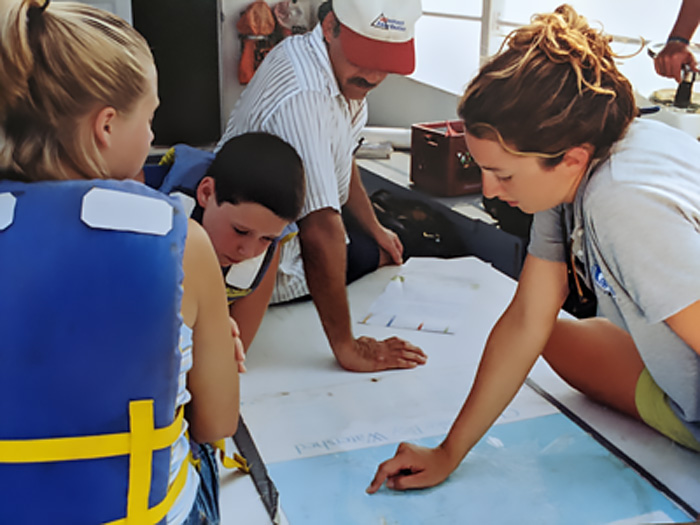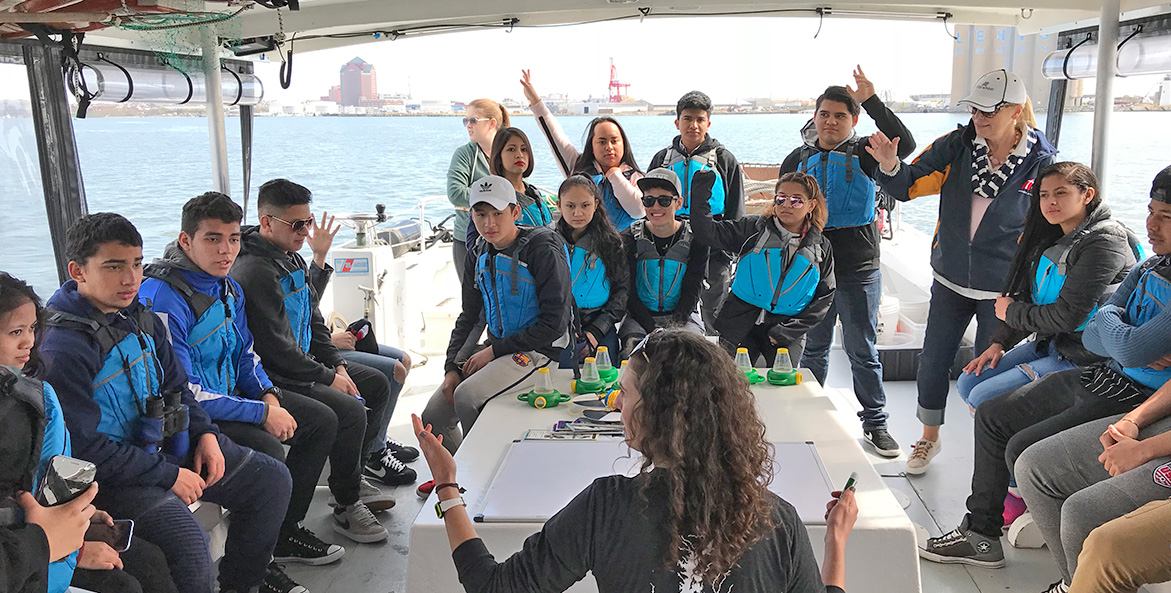A version of this article originally appeared in the Spring 2023 issue of Save the Bay magazine.
In summertime, when meadows of underwater grasses grow in the waters of Tangier Sound, the Bay is bounty.
I first truly experienced this incredible biodiversity the summer I moved to Port Isobel Island after college. The majority of the island, located just east of Tangier Island at the southernmost point between the sound and the open Bay, was gifted to CBF in the 1980s for an environmental education center. My job there was to teach students and adults alike.

CBF President and CEO Hilary Harp Falk engages students during her tenure as a CBF educator in the early 2000s.
CBF Staff
One of the tools we used was a scrape, a specialized gear that islanders have long employed to harvest crabs from their hiding places in the grass beds. A pass of the scrape quickly reveals the many other critters that hide there, too; we would often find seahorses, pipefish, grass shrimp, and any number of small fish, worms, and crustaceans. Occasionally, a fin would glide through the shallow waters, and we’d reassure students they belonged to cownose rays, not sharks.
We have so much to learn from the world around us. Our watershed is a great teacher, whether it’s an underwater grass bed in the middle of the Bay or the street near our home that floods whenever it rains. We also have so much to learn from each other. At Port Isobel, my own education vastly expanded under the tutelage of the other educators, island captains, and community members who took me under their wing. Some lessons were practical—fixing things that broke, docking a boat, finding fish. Others were essential on another level—how to achieve meditative peace ‘proggin’ for washed-up treasures or cope when storms turned harsh and winters became isolating.
These lessons, the ones we learn by being there, immersed in our environment and our communities, are the lessons that stick. Over the past 50 years, CBF’s Education Program has introduced more than 1.5 million people to these sorts of experiences across the watershed. What the numbers can’t tell you are the countless individuals those experiences have inspired to make change in their own lives and the lives of those around them.
[Today's young people] aren't frightened by the many challenges our world faces, they're emboldened. Their commitment to solutions and optimism for the future are an inspiring lesson—one we'd all do well to learn.
For me, interacting with the decisionmakers and elected officials we occasionally hosted at Port Isobel helped open my eyes to the way policy can shape our environment and all of us who depend on it. The centers of power where they worked seemed leagues away from the marshes, but the actions they took there inevitably flowed downstream to us.
The same is true of the actions that businesses, farmers, community organizations, and every one of us take each day. Restoring our watershed now and for future generations isn’t just up to scientists and environmentalists. The solutions are cross-disciplinary and will take all of us working together, in every sector.
Today’s young people know this intuitively. They aren’t frightened by the many challenges our world faces, they’re emboldened. Their commitment to solutions and optimism for the future are an inspiring lesson—one we’d all do well to learn.




